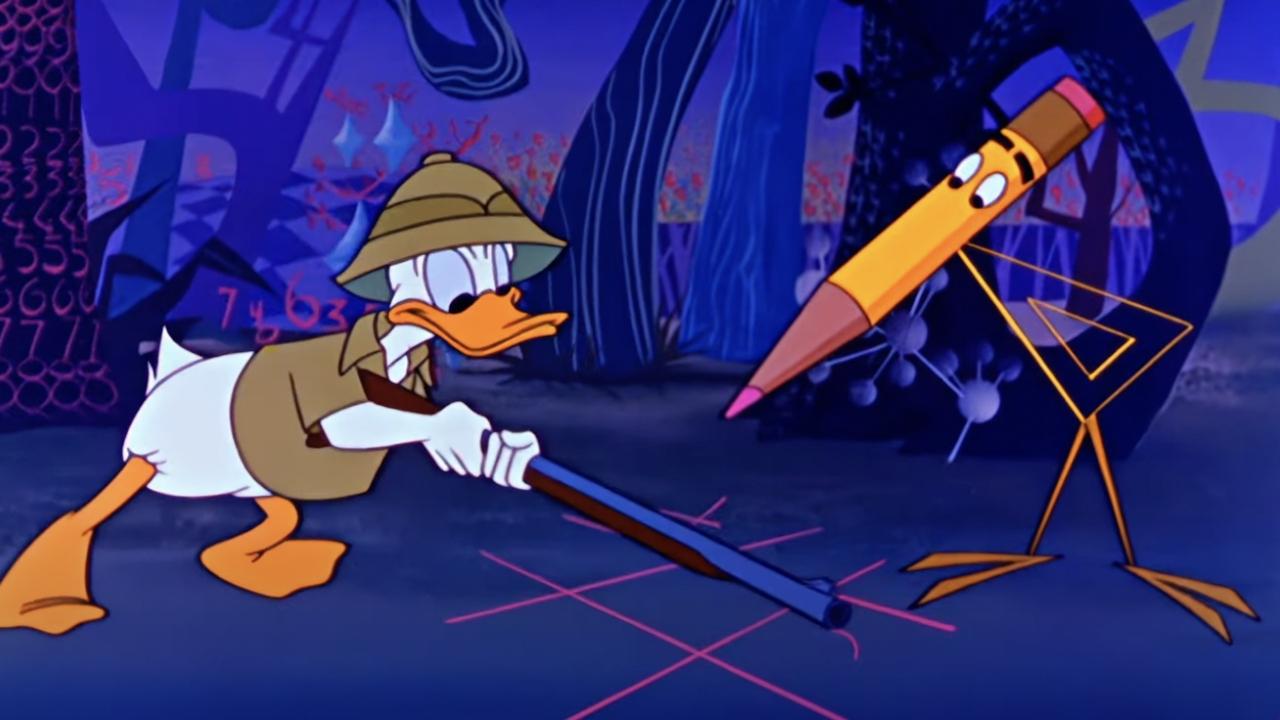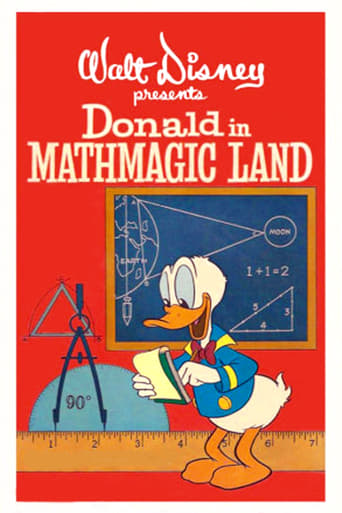


What makes it different from others?
... View MorePlot so thin, it passes unnoticed.
... View Moren my opinion it was a great movie with some interesting elements, even though having some plot holes and the ending probably was just too messy and crammed together, but still fun to watch and not your casual movie that is similar to all other ones.
... View MoreWhile it doesn't offer any answers, it both thrills and makes you think.
... View MoreIn a strange and gloomy place, a giant shadow breaks into the darkness, a reassuring presence: it's our old friend Donald Duck, with a shotgun and a safari hat, seems like he's ready for a wilderness trip. But what a strange opening, numbers lie on the ground, trees have (literally) square roots and a weird bird-like creature made of a triangle, a square and a circle recites Pi (with a mistake in the numbers' sequence from what I read). This is where Donald calls someone and a voice answers him. This is Paul Frees, the narrator of this glorious journey in the world of Mathematics.But Donald is immediately turned off; this is eggheads' stuff, which shows the lucidity of the writers regarding the reception the film would get, especially among schools' pupils. And till now, how many people, almost proudly, declare they hate math or never got it. But how many of them became athletes, musicians, artists or botanists? This is one of the greatest lessons of "Donald in Mathmagic Land", math is everywhere, and those who don't feel too hot about it might underestimate how daily exposed their line of works is to numbers and geometry.So, Donald couldn't have been more wrong, and without asking for permission, the voice takes him to Ancient Greece, when Pythagoras invented music through a simple use of divisions applied to a string, obtaining a different sound depending on the portion you plunk, the genesis of the scale of music we're all familiar with. Then the film transitions from Pythagoras to the pentagram, the sign of recognition he used with his disciples, a form that contains great applications in Arts and architecture. The film turns to a more playful tone, with a few insights on the use of math in games, sport and geometric forms in the real world. Finally, the conclusion acknowledges that math hasn't revealed all their secrets, and the boundlessness of human mind might welcome new discoveries.Indeed, while I was checking on Youtube comments, I was fascinated by the way everyone seems to have a story with "Donald in Mathmagic Land". Some had their first encounter with the film from a school (old-school) projector, others had it in a low quality VHS, a few vaguely remember a weird Donald Duck cartoon full of geometric forms, documentary footage and some stuff about music and games. Yet what do these people have in common? They were overwhelmed by a nostalgic feeling when finally rediscovering the short film on a device that relies on binary programming, math again, and for such a magical (nostalgia-inducing) feeling mathmagic, indeed.Still, I read some comments on IMDb complaining that the film failed to deliver its premise and betrayed a sort of intellectual pretension from Disney studios. Well, I don't think of any cartoon that took the same challenge after this one, and the film is so didactic and pedagogical that it's very likely to raise an interest on math, so what's the problem? And speaking of my personal experience, although I had this film recorded at the age of 8 (it was the Disney Channel and the program was always closing with a longer feature), as I was growing up, my passion for mathematics grew and so did my interest for this short.I was not just good at math, math made me curious and playful. There was something fascinating in that flawless universe where certitudes were absolute, a world of real application, yet all made of abstractions, the greatest challenge human intelligence ever had, one that shaped our universe, our history in its most appealing forms: nature, music, sports, beauty and progress. There's nothing that doesn't owe something to Math.And it's all a matter of proportions, like the Golden rectangle, the figure that keeps the same proportions, everything obeys the same rules, and what applies on the vast universal scale, applies to nature and human body. The gravity operates on the planets as well as billiard balls; a big wheel moves a car while a small one makes a telephone work. The same proportions of a musical scale can be indirectly found in a tree's form. And when I finally got the pentagram part at the age of 17, I immediately took a paper sheet to check by myself the properties. It was magical.This is a ubiquity one can't ignore, and it's remarkable how the essential about math is showcased in less than half an hour. Esthetically, the film finds the perfect pedagogical note, swinging back and forth between real-life footage, cartoons, and schematic explanations. I didn't notice it back then, because I didn't much care for the times of release, but now in 2016, I can't help but feel a weird sadness watching these images, because they were meant as contemporary illustrations, but now, the movie itself has become a past relic of its own present, dated because it ended before the greatest revolution mathematics would provide: computer's binary programs with all their 0 and 1.But to his credit, the narrator tells us that the applications of math are infinite, you can't confine them in a chamber or a limited space, let alone a short cartoon, only the mind is boundless enough to contain all the possible knowledge. The film is much aware on that, and therefore closes on this note with this great quote from Galileo: "Mathematics is the alphabet with which God has written the universe". So, as long as there will be a universe, there will be this universal language, and people from all over the world enriching our civilization on the field of Arts and Sciences.And with his limited screen-time, Walt Disney studios wrote the greatest tribute to mathematics, a marvel of edutainment that certainly encouraged many vocations, as sure as eggheads are eggheads.
... View More"Donald in Mathmagic Land" is a 27-minute short film which explores basic mathematic references in everyday life. 27 minutes may be long for cartoons from that era, but it's really short given the fact that there were no less than 4 directors and 3 writers working on it. I am sort of interested in maths and I've always liked Donald, but still somehow I did not find this one particularly interesting or funny. Then again I am not really big on Disney's works who take themselves seriously as an educational movie. The Academy thought otherwise and nominated it for an Oscar, but it lost to the Dutch entry from that year. Another mathematics meets cartoon idea won the Oscar, namely "The Dot and the Line: A Romance in Lower Mathematics": if you enjoyed Donald's take here, you may want to check that one out as well. It's also not even half as long. This one here is already over 55 years old and yet it is far from being one of the early Donald cartoons. And also far from being among the best in my opinion. Not recommended.
... View MoreOne of the greatest films of all time. well, maybe one of the greatest educational films of all time. Disney could always make educational films fun and entertaining, and next to his 'Man in Space' series, this is his best. definitely his most timeless since some of the information in the 'Space' series is now dated. only problem is, this is so entertaining you just kick back and watch the cool retro animation and forget to take in the math lesson.Donald Duck quacks,squeaks and squawks his adorable little self through a succession of colorfully presented math lessons ending with a quote from Galileo that's intended to inspire awe and make us ponder the universe. I would have, but I was still too busy thinking about how cute Donald looked. especially when he was playing pool against a live action background.
... View MoreA Walt Disney DONALD DUCK Cartoon.While looking for true adventure, DONALD IN MATHMAGIC LAND learns a great deal about the vital importance of mathematics in the Universe.Loosely based on Lewis Carroll's ALICE books, this short film uses fun & fancy to teach some pertinent facts about the wonder of mathematics. Some of the ideas of Pythagoras are examined, the mysteries of the 'Golden Rectangle' are explored and the mathematical principles of the games of chess & billiards are exposed. The voice of Paul Frees as the Spirit of Adventure makes a fine counterpoint to Clarence Nash's vocalization of the Duck.Walt Disney (1901-1966) was always intrigued by pictures & drawings. As a lad in Marceline, Missouri, he sketched farm animals on scraps of paper; later, as an ambulance driver in France during the First World War, he drew comic figures on the sides of his vehicle. Back in Kansas City, along with artist Ub Iwerks, Walt developed a primitive animation studio that provided animated commercials and tiny cartoons for the local movie theaters. Always the innovator, his ALICE IN CARTOONLAND series broke ground in placing a live figure in a cartoon universe. Business reversals sent Disney & Iwerks to Hollywood in 1923, where Walt's older brother Roy became his lifelong business manager & counselor. When a mildly successful series with Oswald The Lucky Rabbit was snatched away by the distributor, the character of Mickey Mouse sprung into Walt's imagination, ensuring Disney's immortality. The happy arrival of sound technology made Mickey's screen debut, STEAMBOAT WILLIE (1928), a tremendous audience success with its use of synchronized music. The SILLY SYMPHONIES soon appeared, and Walt's growing crew of marvelously talented animators were quickly conquering new territory with full color, illusions of depth and radical advancements in personality development, an arena in which Walt's genius was unbeatable. Mickey's feisty, naughty behavior had captured millions of fans, but he was soon to be joined by other animated companions: temperamental Donald Duck, intellectually-challenged Goofy and energetic Pluto. All this was in preparation for Walt's grandest dream - feature length animated films. Against a storm of naysayers, Walt persevered and over the next decades delighted children of all ages with the adventures of Snow White, Pinocchio, Dumbo, Bambi & Peter Pan. Walt never forgot that his fortunes were all started by a mouse, or that childlike simplicity of message and lots of hard work always pay off.
... View More